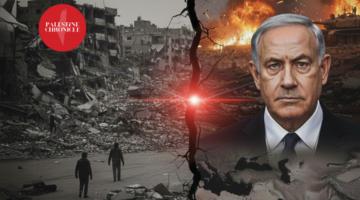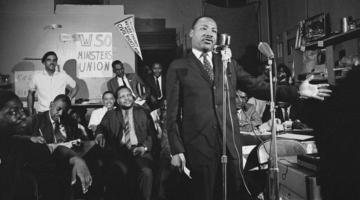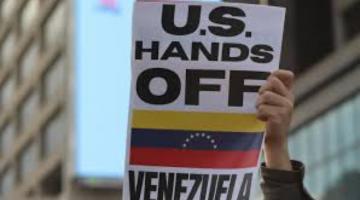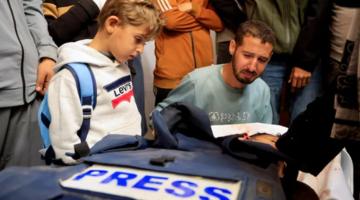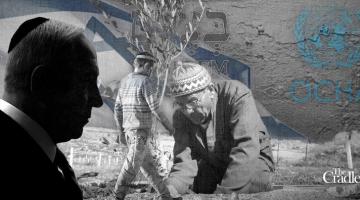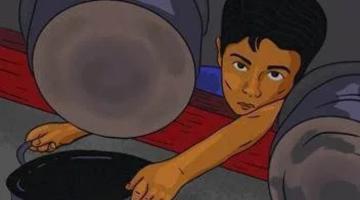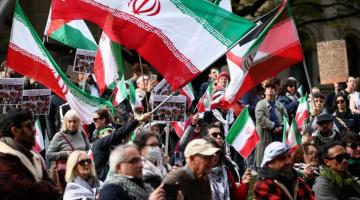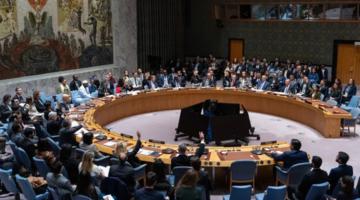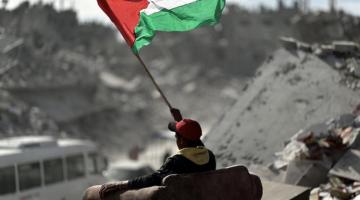The statement on the UN Partition of Palestine by the Arab Higher Committee is a reminder of the sordid history of the U.S. in the expropriation of land and the attempted ethnic cleansing of the people of Palestine.
Ceasefires of unceasing fire. Resolutions without resolve. Not for the first time, the US actions in the United Nations (UN) have exposed the wretched ineffectiveness of that international entity when it comes to defending the lives and rights of the Palestinian people. Just over a week ago, the United States refused to support the UN Security Council’s (UNSC) otherwise-unanimous vote for a temporary halt to the genocide in Gaza. For the first time, the US abstained from the ceasefire vote, instead of vetoing it outright, but quickly called the UN’s resolution “non-binding” – and, effectively, pointless. The blood-soaked palm of Linda Thomas Greenfield, again, signified the imperial and impetuous American abstention; the US greenlighting of a new $2.5bn weapons package to the zionist entity in the days after the UNSC vote cynically demonstrated that their real commitment is to genocide.
For Palestine, this is nothing new. The US has repeatedly refused to use the UN stage to censure the actions of the zionist entity against Palestine. And in fact, almost since the formation of the UN in 1945, the organization has repeatedly betrayed the Palestinian people as the US has either bought or bullied UN member states into supporting the zionists. Indeed, the 1948 UN vote that endorsed the partition of Palestine was less an exercise in international democracy than a performance of corruption, coercion, and intimidation by the US superpower over smaller, weaker states.
This history of bullying and brow-beating is described in detail in a February, 6, 1948 statement sent by Isa Nakhleh, Representative of the Arab Higher Committee, to the UN Palestine Commission following the vote in favor of partition. In the statement, Nakhleh asserts that “The Arab Higher Committee maintains that the partition recommendation does not represent the sentiments of the United Nations.” He accuses the US of strong-arming other UN members into voting for partition, writing, “The pressure put by the United States Delegation and Government on certain nations, whether at Lake Success [in Long Island, site of the original UN headquarters] or in these nations’ capitals, is nothing short of political blackmail.”
Of the examples of this political blackmail that Nakleh documents, two are particularly painful for us: that of Liberia, and that of Haiti. Both countries followed the US lead when it came to voting for partition, making both countries complicit in the inevitable decades of slaughter emboldened and enabled by the UN decision. Naklheh asserts that Liberia was going to vote against partition. However, the Liberian delegate, Ellen Scarborough, changed her vote after she was threatened with physical violence, prompting her to ask for police protection.
As for Haiti, it is worth reading Nakhleh’s comments in full:
The delegate of Haiti on Wednesday made a very strong speech against partition, on instructions from his Government. On Saturday he circulated a note to Delegations explaining that he is voting for partition in accordance with fresh instructions from his Government. The Haitian Delegate did not find words to describe his shame and he was seen in tears in the lobby and Delegates’ lounge. Being a sincere and noble man, he could not hide the fact that his Government surrendered to pressure and was forced into changing its instructions to him.
At the time, Haiti’s president was the progressive Dumarsais Estimé. Haiti’s delegate to the United Nations was Ernest Chauvet, the mulatto editor, as Cedric Dover described him, of Le Nouvelliste, who had been jailed during the US occupation of Haiti for his criticisms of the occupation’s policies and puppet government. Unsurprisingly, Chauvet denied Nakhleh’s accusations, claiming that Haiti’s entire history was one of standing up against the Great Powers while asserting an identification with the plight of the Jewish people.
Yet what Chauvet does not mention is the role of Haiti’s small zionist community in determining Haiti’s decisions over Palestine. The Jerusalem Post recently noted that Charles Shalom Bigio “played a role in Haiti's support for Israeli statehood in the November 1947 vote at the United Nations.”
Bigio (1906 – 1968) arrived in Haiti via Aleppo, Syria, in 1925, joining family members who had already established mercantile operations in the country at the end of the nineteenth century. He was the father of Gilbert Bigio, Haiti’s only billionaire and chairman of the powerful GB Group of companies. Bigio and the GB Group own the port through which it is alleged weapons enter the country and he is currently sanctioned by Canada for his role in fomenting Haiti’s current crisis. Bigio is the honorary consul in Haiti to Israel and, tellingly, Reuven Bigio, son of Gilbert, grandson of Charles, has admitted an allegiance to Israel, not Haiti, even as it is Haiti and the Haitian people that have contributed to the family’s wealth for more than one hundred years. “Israel to us is the motherland. It's the rock. It's how we identify ourselves," Reuven Bigio said.
What role did Charles Bigo play in “Haiti’s support for Israeli statehood?” Was he behind the pressure placed on Ernest Chauvet to vote for partition at the UN? At this point, we do not know the facts. But what Isa Naklheh’s statement offers is a reminder of this sordid history of the western countries – especially the U.S. – and their control of what passes for the “international community” in the expropriation of land and the attempted ethnic cleansing of the people of Palestine. And his statement should remind us of the deep, historical ties connecting Palestine, Haiti, and the other small nations of the world who have been the abused foster-children of the global establishment – and who exist in an international netherworld in which neither rules nor order exists. We reprint Naklheh’s statement on behalf of the Arab Higher Committee below.
United Nations Palestine Commission, Partition recommendation
Statement of 6 February 1948 Communicated to the Secretary-General by Mr. Isa Nakhleh, Representative of the Arab Higher Committee
Your Excellency:
With reference to Your Excellency’s telegram dated the 9th of January [1948] inviting the Arab Higher Committee to appoint a representative “to be available to the Palestine Commission for such authoritative information and other assistance as the commission may require,” and with reference to my telegram dated the 18th of January in which I communicated to Your Excellency the decision of the Arab Higher Committee, I have the honor to submit the following reasons for such decision:
1. The Arab Higher Committee maintains that the partition recommendation does not represent the sentiments of the United Nations. We cannot forget that the resolution of partition in the Ad Hoc Committee secured 25 votes only. When the matter was referred to the General Assembly on the 26th of November, there were 17 nations opposing partition. Had voting taken place on that date the partition proposal would not have obtained the required two-third majority. The Arab Higher Committee cannot forget the maneuvers made by the President of the Assembly and some delegates supporting partition in order to postpone taking votes on that day when they realized that their proposal might be defeated.
2. The pressure put by the United States Delegation and Government on certain nations, whether at Lake Success or in these nations’ capitals, is nothing short of political blackmail. The following represent only a few instances:
(a) The delegate of Siam was accepted in the Ad Hoc Committee as a vice chairman until he showed his intention to vote against partition. Then he was threatened that his credentials would be refused. As a consequence he was forced not to attend.
(b) The delegate of Haiti on Wednesday made a very strong speech against partition, on instructions from his Government. On Saturday he circulated a note to Delegations explaining that he is voting for partition in accordance with fresh instructions from his Government. The Haitian Delegate did not find words to describe his shame and he was seen in tears in the lobby and Delegates’ lounge. Being a sincere and noble man, he could not hide the fact that his Government surrendered to pressure and was forced into changing its instructions to him.
(c) General Carlos P. Romulo, Head of the Philippines delegation, on Wednesday made a very strong and courageous speech denouncing partition declaring: “At the behest of my Government, the Philippine Republic regrets its inability to approve of or participate in a solution of the Palestine problem that would involve the encouragement of political disunion and the enforcement of measures that would amount to the territorial mutilation of the Holy Land.”
But on Saturday and in the absence of General Romulo there were two Philippines Delegates, each claiming different instructions — one to vote against partition as instructed by the head of his delegation, the other supporting partition according to fresh instructions from his Government. It is an established fact that strong pressure was put on the Philippines Government by the United States Government and, according to reliable information, the United States Government threatened the Philippines Government that it will not grant it the loan it is asking for if its delegation fails to support partition. In this way the Arabs lost the Philippines vote.
(d) The Liberian delegate on the Ad Hoc Committee, Mrs. Ellen Scarborough, on the 25th of November abstained from voting although it was known that the Liberian Delegates intended to vote against partition in the Assembly. Thereupon the Jewish Agency and its pressure squads threatened her with actual physical violence which caused her to ask for police protection. On Saturday, the 29th of November, due to heavy pressure on the said Government, the Liberian Delegation voted for partition.
3. This undue pressure was not limited to the aforementioned delegations, but to every other delegation and its Government abroad. The following quotations from speeches of delegates prove this point:
(a) Dr. Ernesto Dihigo of Cuba, in his speech in the Assembly on November 28th said: “Having formed and given our view, we feel that we have to express our view through our vote, in the maintenance of consistency, in spite of pressure which has been brought to bear upon us.”
(b) Dr. Alfredo Lopez, Head of the Colombia Delegation, in his speech in the Assembly on the 28th of November, said: “Partition here may eventually be adopted, but we submit that reluctant votes, recruited with irrelevant eleventh hour appeals, will not improve its position in the opinion of the outside world.”
(c) Sir Zafrullah Khan, Head of the Pakistan Delegation, said: “Those who have no access to what is going on behind the scenes have known enough from the press to have a great fear in their hearts not only on this question — because this is one individual question that has come up — but that the deliberations and decisions of this great body in which the hopes of the world for the future are centered will not on crucial questions be left free. This is a solemn moment, solemn in the history of the world, in the history of this great — let us hope, at least, great — Organization. The United Nations is today on trial. The world is watching and will see how it acquits itself, again, perhaps, not so much from the point of view of whether partition is approved or not approved, but from the point of view whether any room is to be left for the exercise of honest judgment and conscience upon these important questions when they come up for decision.”
Also Mr. Mohammed Ayub of the same Delegation said as follows: “We did succeed in persuading a sufficient number of our fellow representatives to see the right as we saw it… We entertain no sense of grievance against such of our friends and fellow representatives who have been compelled, under heavy pressure, to change sides and to cast their votes in support of a proposal, the justice and fairness of which do not commend themselves to them. Our feeling for them is one of sympathy that they should have been placed in a position of such embarrassment between their judgment and conscience on one side and the pressure to which they and their Governments were being subjected on the other.”
4. Such flagrant interference and pressure were not exercised by the United States Government only, but also by United States Senators. The Arab Higher Committee Delegation saw several telegrams out of many hundreds by United States Senators addressed to Delegates of different nations threatening, persuading and putting improper pressure on these Delegates to sway them in favour of partition.
5. The President of the General Assembly, Mr. Oswaldo Aranha, who being president should have been very impartial, was contrary to the traditions of presidency, influencing the Latin-American countries to vote against the Arabs. A report of a speech by him appeared in the P.M. of New York in its issue of October 9th as follows:
“Oswaldo Aranha of Brazil, President of the General Assembly warned Latin-American Delegates that failure on their part to support the United States-Soviet agreement on partition of Palestine would be a further heavy blow to the weakened United Nations. Aranha stressed the point at a recent Latin-American caucus after several delegates had declared themselves impressed with Arab claims that United Nations lacked authority under the Charter to partition any State.” Without making any comment on these juridical claims, Aranha is reported to have said: “I want to impress upon all of you that they are, at best, merely juridical.”
Mr. Aranha was faced with this report in the press but he made no public denial.
6. It is an elementary rule of law and justice that any decision, agreement or act made or done under pressure, undue influence or duress, is null and void. The aforementioned facts prove how the partition recommendations were extorted from member states of the United Nations. The Arabs therefore consider them null and void and of no legal or moral force.
7. The Arab Higher Committee Delegation maintains that the recommendation of partition is also contrary to the letter and spirit of the United Nations Charter. The Arab Delegations have fully dealt with this point in their addresses in the Ad Hoc Committee and in the Assembly. Their arguments were unanswerable, but power politics ignored all the logic, reason and justice of their arguments and Delegations were being led by undue pressure and influence to make recommendations repugnant to the Charter.
8. The United Nations has no jurisdiction to order or recommend the partition of Palestine. There is nothing in the Charter to warrant such authority, consequently the recommendation of partition is ultra vires and therefore null and void.
9. The Arab Delegations submitted proposals in the Ad Hoc Committee in order to refer the whole legal issue raised for a ruling by the International Court of Justice. The said proposals were never put to vote by the president in the Assembly. The United Nations is an International body entrusted with the task of enforcing peace and justice in international affairs. How would there be any confidence in such a body if it bluntly and unreasonably refuses to refer such a dispute to the International Court of Justice?
10. The Arab Higher Committee Delegation wishes to reaffirm here that the Arabs of Palestine cannot recognize the Balfour Declaration, the Mandate of Palestine or any situation arising or derived therefrom. They consider that imposing international alien immigrants on their country by force is nothing but an act of aggression and invasion, whether made by Jews themselves, through Great Britain, or by the United Nations. The Arab Higher Committee Delegation therefore expects that the duty of the United Nations is to remove the said aggression and stop that invasion. The creation of any Jewish state in an Arab territory is more than invasion or aggression, it is something with no precedent in history. It is an act of wiping out the existence of an Arab country, violating its integrity, subjecting its land and people to foreign Jewish domination.”
11. In its statement to the Ad Hoc Committee on the 29th of September, our Delegation left no doubt on the Arab reactions: “The Arabs of Palestine are, therefore, solidly determined to oppose, with all the means at their disposal, any scheme that provides for the dissection, segregation or partition of their tiny Country, or that gives to a minority, on the ground of creed, special and preferential rights or status. They will oppose such schemes, with the same zeal and with the same sacrifice that any other people would do under the same circumstances. We are alive to the fact that if they so desire, big powers could crush, by brute force, such opposition. But this realisation will not deter us from drenching the soil of our beloved country with the last drop of our blood in the lawful defense of all and every inch of it.” These solemn words were dismissed by the Zionists and the powers supporting them as idle threats. The events in Palestine since the end of November are only the beginning of this tragedy. Already over 1000 persons have been killed and over 2000 injured.
12. The Zionists and their friends are building a smoke screen of propaganda to convince the world that if the partition plan is not implemented by force the prestige of the United Nations is at stake. Secret maneuvers are being carried out to lead the Security Council to send an international force to Palestine to crush Arab resistance. Our Delegation solemnly declares that it is the unflinching determination of every Arab in Palestine to defend his country against any power or group of powers or any force going to Palestine to partition the country. The Arabs are in duty and honour bound to defend their country to the last man. The presumed mission of an international force which is to be sent to Palestine can only be to wipe out the Arabs, blow up their dwellings and uproot them from their land.
History will then record that the United Nations, which was meant to be an instrument of peace and justice, is being used as an instrument of war and aggression.
13. In conclusion, the Arab Higher Committee Delegation wishes to stress the following:
(a) The Arabs of Palestine will never recognise the validity of the extorted partition recommendations or the authority of the United Nations to make them.
(b) The Arabs of Palestine consider that any attempt by the Jews or any power group of powers to establish a Jewish state in Arab territory is an act of aggression which will be resisted in self-defense.
(c) It is very unwise and fruitless to ask any commission to proceed to Palestine because not a single Arab will cooperate with the said Commission.
(d) The United Nations or its Commission should not be misled to believe that its efforts in the partition plan will meet with any success. It will be far better for the eclipsed prestige of this organization not to start on this adventure.
(e) The United Nations prestige will be better served by abandoning, not enforcing such an injustice.
(f) The determination of every Arab in Palestine is to oppose in every way the partition of that country.
(g) The Arabs of Palestine made a solemn declaration before the United Nations, before God and history, that they will never submit or yield to any power going to Palestine to enforce partition. The only way to establish partition is first to wipe them out — man, woman and child.


